How to ensure data security using remote developers
Introduction
Data security safeguards sensitive information from misuse, unauthorized access, or disclosure. It is crucial to secure your data, as it is susceptible to being compromised, resulting in financial loss or damage to your reputation. Hiring remote developers could present unique security threats to your data because they operate at a distance and require access to similar security protocols and procedures that employees in the company use. In this article, we'll look at the importance of remote developers for ensuring data security is protected and the best steps to secure your data when you hire remote developers.
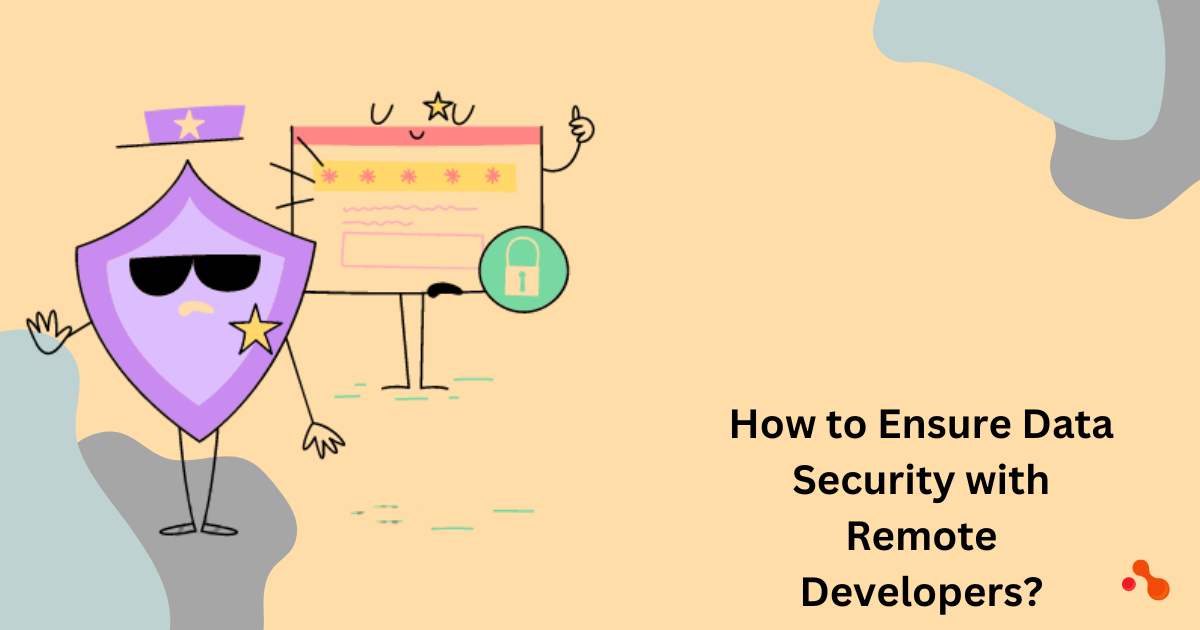
Understanding Remote Developers
If you employ developers, you can hire them to work on-site or remotely. Remote developers operate from a different place than the physical office of the business. Here are some important things to consider regarding remote development:
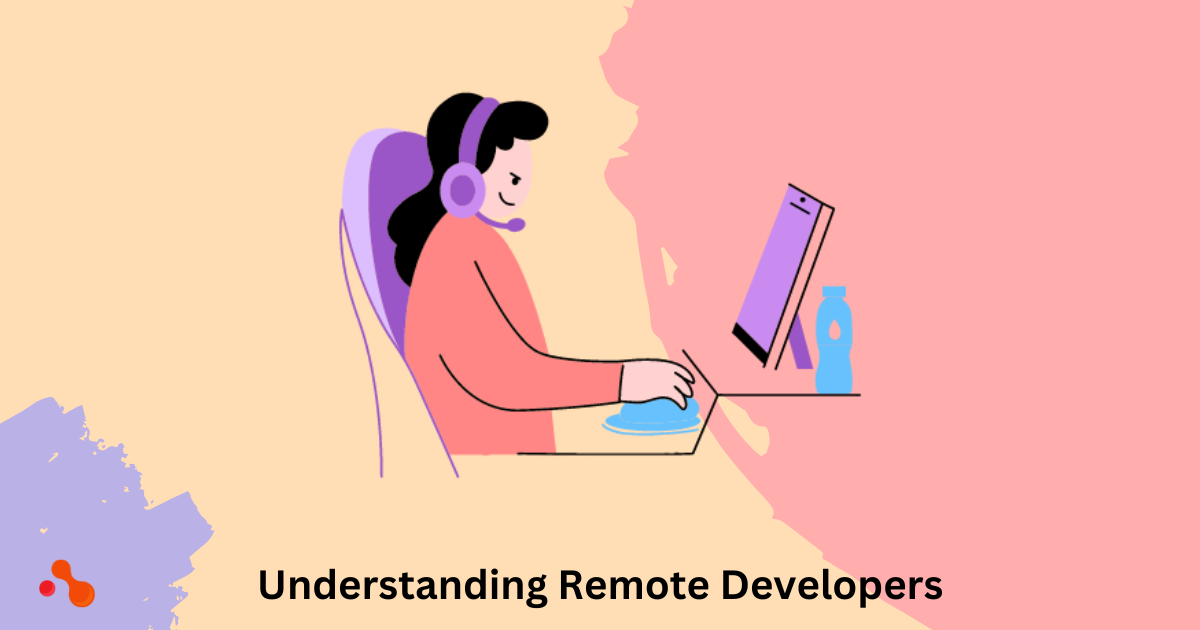
A. Description of Remote Developers:
- Remote programmers are experts working from a place away from the company's office.
- They work with the same passion and professionalism as on-site developers, employing various communication tools to keep in touch with their team.
B. The advantages of hiring remote developers:
- Cost-effectiveness: By employing remote programmers, businesses can cut costs on office spaces, electricity, and equipment.
- Companies can hire access to a wider talent pool. Remote developers to access a broader talent pool without being restricted to local talent pools.
- A better work-life balance Remote developers will enjoy greater flexibility and better work-life balance, resulting in greater work satisfaction and productivity.
C. The disadvantages of hire remote developers:
- Collaboration and communication: Effective collaboration and communication can be difficult while working from a distance and require greater effort on the part of both remote developers as well as members of the group.
- Differences in time zones Working with remote developers in different time zones could make scheduling and coordination more complicated.
- Reputation and trust The company must be confident that remote developers are operating how they are expected to, and remote developers need to ensure that they are accountable for their actions.
Example: A company that wants to recruit an expert in software development to work on a project should look at both remote and on-site developers. Remote developers may be situated in various countries and have different working hours and work schedules; therefore, the company must consider whether this is the right choice to meet their needs.
Data security is a concern for remote developers.
Ensuring your company's data is protected when hiring remote or in-house developers is vital. Here are some suggestions to ensure data security when hire remote developers:
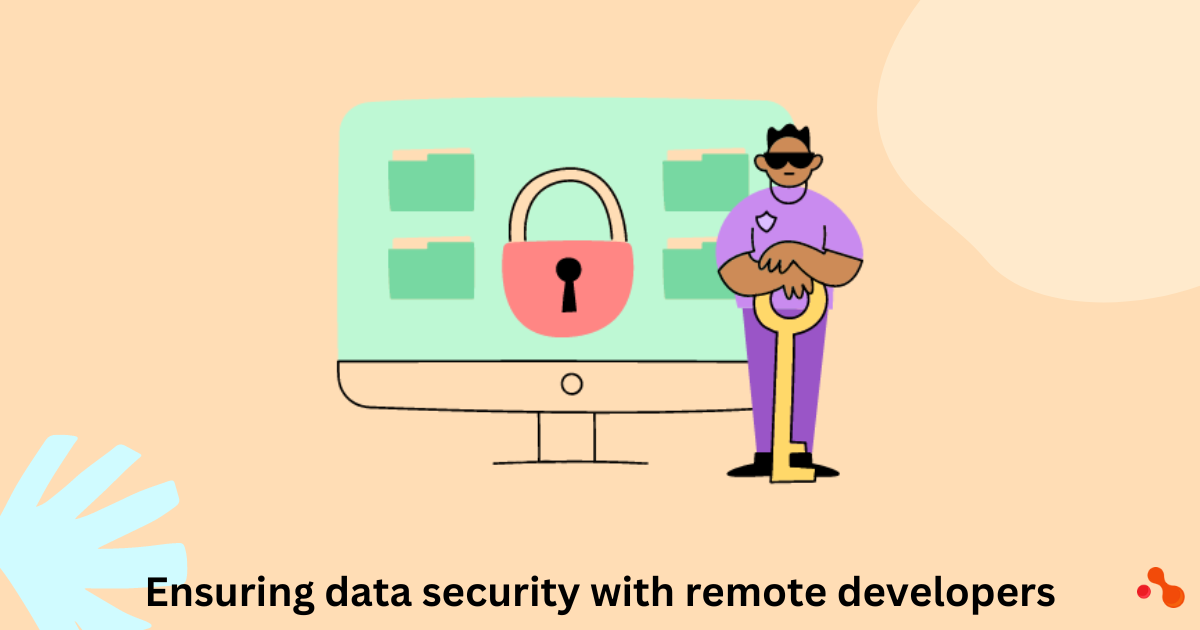
A. Security protocols are essential to establish:
- Create a clear security strategy and ensure remote developers know and respect it.
- Define the roles and responsibilities of remote developers concerning the security of data.
B. Ensuring secure networks:
- Instruct remote coders to utilize secure networks, such as VPNs or virtual private networks (VPNs), to access your company's data.
- Make sure that remote developers utilize only licensed devices and networks.
Implementing strict access controls
- restrict remote developers' access to the required information.
- Please use a multi-factor authenticator (MFA) to confirm you are who they claim you are.
D. Monitoring and regularly reviewing data access and use:
- Track remote developers' access to company data and track all activity.
- Continuously review logs of access to data to spot any suspicious activity.
E. Instruction of remote developers in the best practices in data security:
- Give remote developers education on best practices and how to identify suspicious activities.
- Be sure that they are aware of their responsibilities in ensuring the security of your data.
For example, suppose you have a remote developer involved in a task containing sensitive customer information. In that situation, it's crucial to ensure that they are aware of the importance of protecting the data and the protocols they have in place to ensure that they do. These suggestions will help you protect your company's data by hiring remote developers.
Tools and technologies to help with data security
When you hire developers, particularly remote developers, it is crucial to secure your data. There are many tools and techniques you can employ to accomplish this purpose. Here's a list of some of the important techniques and methods to be thinking about:
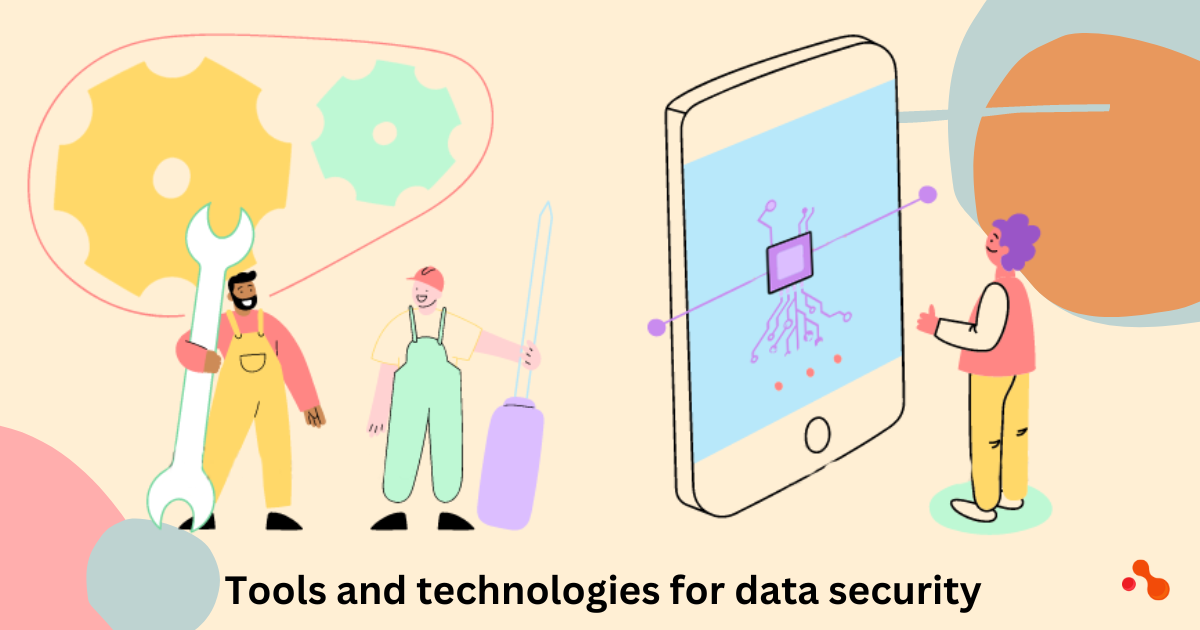
A. A. Overview of Security Tools and Technologies:
- Firewall: This security device for networks is a system that monitors and controls both outgoing and inbound network traffic.
- Anti-virus software was designed to stop, detect, and eliminate malware.
- The virtual private network (VPN) allows you to establish secure connections to another network via the Internet.
- Two-factor authentication (2FA) is an authentication method that requires users to provide two authentication methods to prove their identity.
- Encryption transforms data into a codified language that blocks access by unauthorized persons.
B. The importance of using secure coding techniques
- Utilize secure programming guidelines and best practices.
- Update software and programs regularly.
- Utilize a version control system to monitor changes to the code.
- Perform regular code reviews.
C. Best practices for securing data in transit:
- Make use of HTTPS to protect information during transport.
- Do not use Wi-Fi on public networks.
- Utilize VPNs to access corporate information remotely.
- Implement secure data transfer protocols, such as SFTP and SSH.
D. Best Methods to Secure Data at Rest:
- Encrypt your data to protect sensitive information.
- Install access control measures that limit who has access to the information.
- Make backups to ensure the recovery of data in the case of a security attack.
- Securely store data on encrypted storage devices.
In the end, if you engage remote developers, you must consider using security tools and techniques that use certain code practices, protecting data during transport, and securing data while it is in transit. If you follow these guidelines, you can guarantee the safety and security of the sensitive information you store in your company.
Best Methods to Secure Information Security for Remote Developers
In the current digital age, numerous companies hire developers, such as remote developers, to develop their software. Although remote developers provide numerous advantages, including saving money and accessing an international talent pool, ensuring data security isn't compromised is vital. Here are some good practices to protect your data from remote developers:
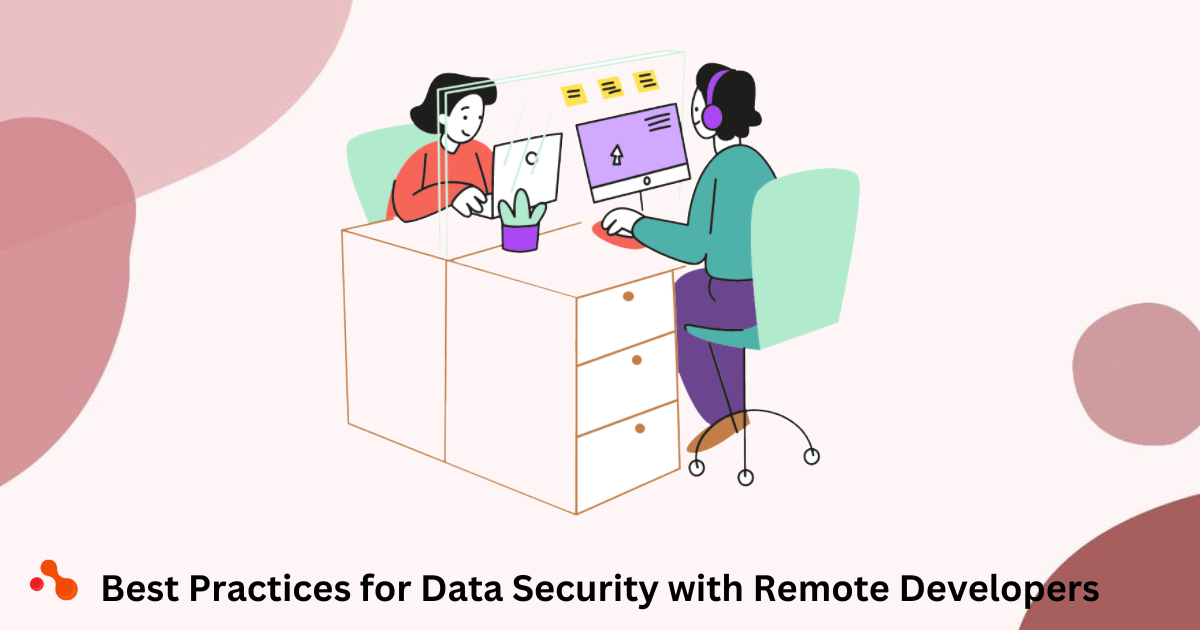
Documentation and clear communication
- It is important to clearly define guidelines and policies for data security that remote designers follow.
- Offer detailed instructions on how you can access and manage sensitive data.
- Set up clear channels to report security concerns or breaches.
- Utilize encryption platforms and tools to exchange information and data with developers from remote locations.
- Document all security procedures and policies.
B. Regular vulnerability and risk assessments
- Conduct periodic risk assessments to determine security vulnerabilities and threats.
- Utilize security tools that scan for vulnerabilities to find and correct security holes within the system.
- Always refresh your system and software to ensure they are updated with the most recent security patches and corrections.
- Conduct penetration tests to discover any vulnerabilities in the security of your system.
Disaster recovery and backup plans
- Always back up your data and keep it in a safe place.
- Create an emergency plan for recovery to ensure that your data can be restored during a security attack or system malfunction.
- Check the backups and disaster recovery plans often to ensure they function effectively.
D. Planning and testing for incident response
- Create an incident response plan to swiftly and efficiently respond to security-related incidents.
- Training remote developers on how to spot and deal with security issues
- Conduct regular exercises for responding to incidents to ensure that the parties are aware of their responsibilities and roles in the case of a security breach.
An example: Let's say a company employs remote developers to build their online store. To safeguard data, The company follows these best practices.
- Specifies data security policies along with guidelines and standards for remote developers.
- Gives clear guidelines on accessing and working with sensitive information.
- Conducts regular vulnerability scans to detect any security threats that might exist.
- Backups all e-commerce information regularly and keeps it in a safe location.
- Create an incident response strategy to swiftly and efficiently respond to security-related incidents.
Conclusion
Hire remote developers is essential to ensuring businesses keep up with the rapidly changing technology industry in the current digital age. With the growing popularity of remote work, it is essential to protect your data when working with remote developers.
It is essential to create security protocols and secure networks, as well as strict access control and control and audit data access and its use frequently. Training remote developers in the best data security practices is also essential.
Security tools and techniques like certain code practices and best practices to secure information during transport and at rest are highly recommended.
Regular vulnerability and risk assessments, backups, disaster recovery plans, and incident response testing and planning are other best practices businesses must implement to ensure data security.
By using this site you agree to this Privacy Policy. Learn how to clear cookies here
Xavier Dupont de Ligonnès est un ancien ingénieur commercial français qui a été condamné par contumace en 2011 pour le meurtre de sa femme et de ses quatre enfants. حسام حبيب "Exterminateur Fumig Stau A10 (Tauernautobahn Stau A10 (Tauernautobahn): Ein Albtraum für Pendler RCB vs CSK : Le match le plus attendu de l'IPL RSH Asphalt Maintenance dell windows 7 professional 32 bit reinstallation dvd download Proline Landscaping & Pavers LLC